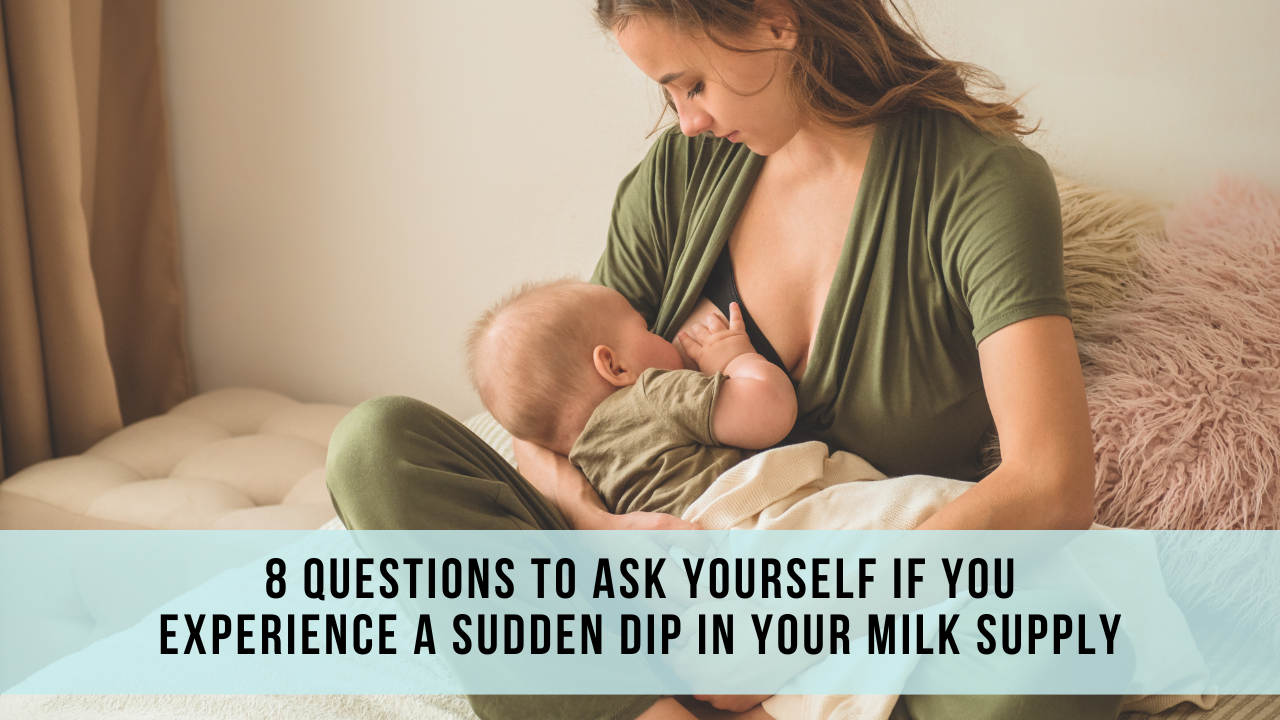Have a sudden dip in your milk supply? Ask yourself these questions!
Feb 27, 2023
I think all breastfeeding moms can relate - we finally feel like we have a good handle on feeding our baby when our milk supply suddenly dips!
This can be super stressful, but most of the time it is only temporary.
Here are the questions I like to ask when this happens.
1. Is mom sick?
Milk supply may drop when mom is ill, but it should return to normal levels once she has recovered.
If you find yourself in this situation, remember it is important to take care of you!
Continue breastfeeding or pumping on schedule. Make sure you are staying hydrated and eating well.
I'm especially concerned if you have diarrhea or vomiting, which could easily lead to dehydration. Oral rehydration (with something like liquid IV) is key.
Talk to your primary care provider about medications to decrease vomiting. You may even consider getting a mobile IV.
2. Is mom taking any new medications?
Did you know that some medications may lead to your milk supply dipping?
-
Pseudoephedrine (Sudafed): This is used to treat nasal congestion and can be found in other cold/flu meds that have -D at the end (such as Zyrtec-D or Allegra-D). One small study showed that just one dose of pseudoephedrine lowered milk supply.
-
Fertility medications like clomiphene: This medication is used to stimulate ovulation. It also lowers prolactin levels which can impact your milk production.
-
Birth control containing estrogen: While taking birth control with estrogen isn’t harmful to the baby, some studies have shown that it can lower your milk supply.
-
If you are using birth control with estrogen while breastfeeding, find one that has the lowest dose of estrogen available.
-
Also, hold off starting the birth control until your milk supply is well established (1-2 months postpartum).
-
3. Is mom on her period?
What is less fun than your first postpartum period? Having your first postpartum period AND experiencing a dip in milk supply.
Moms may notice a drop in supply around the time of mid-cycle to the start of her period.
It is caused by a fluctuation in hormones and is temporary, but it can lead to frustration for mom and baby.
Talk to your OB about a calcium and magnesium supplement during this time to help diminish a dip in supply.
4. Is baby starting to sleep through the night or mom is no longer pumping at night?
It's a blessing and a curse!
When there is a decrease in the demand for milk, your body will adjust accordingly.
So, if your baby had been waking several times a night to nurse or you were pumping during the night and this ends, you may notice your supply has dipped.
It is just your body accommodating the changing needs of the baby.
Can you continue to sleep through the night? Some moms can go 8 hours without experiencing a dip in supply, while others need to pump after 5-6 hours.
You can also add a pumping session right before your bedtime or do a dream feed.
5. How often is mom removing milk?
Is your baby starting to go longer between nursing sessions?
Or have you scaled back on pumping?
Both of these things will impact supply.
Again, it is your body adjusting to the demand for milk.
And remember -- A lot of exclusively breastfed babies will NEVER go longer than 3-3.5 hours in between feeds, during the day -- especially if they are sleeping through the night.
6. Could mom be pregnant?
Surprise or planned pregnancies could definitely affect milk supply.
Typically, a mother can continue breastfeeding while pregnant unless advised by her medical provider to stop.
One thing you may notice is that around the fourth or fifth month of pregnancy, your milk supply could drop.
The milk can change which your child may not like and weaning may start.
If you'd like to continue breastfeeding your older child, you can always restart once your baby is born!
7. Have the pump parts been replaced recently?
If you are exclusively pumping or pumping frequently, I always recommend taking a look at your pump parts.
The white parts should have no tears, of course, but they also need to be replaced more often than you would think.
Each manufacturer will have different recommendations for how often you should replace each part.
You can also see if they are covered by insurance or buy less expensive parts online.
8. Is baby filling up on solids and not as hungry for breastmilk?
Once your baby is eating solid foods, you might notice their demand for breastmilk decreases.
This is a natural progression and your body will adjust to meet their new decreased needs.
I always recommend offering milk BEFORE solids to make sure your baby isn't too full.
Also, make sure your baby is starting with solids gradually and progressing to multiple times per day.
There are so many different reasons why you may notice a change in your milk supply.
If you need help navigating, schedule a 1:1 consult with me and we can work through it together.
>>> Tired of worrying about feeding your baby? Get personalized support so you can enjoy feeding your baby. <<<
Free Resource for Parents and Medical Providers:
The Baby Feeding Database
Helping you understand what formulas are available and narrow down what is best for your family.
This will sign you up for the Baby Feeding Coach email list. I will not spam you. Opt out anytime.










